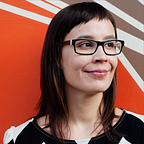Academia as a Feminist in STEM Part 2
I’m three years into my academic career as a permanent lecturer and I am anxiety. After five years of working as an Adjunct Professor, I thought once I got this far, it would be easier. Somehow, I believed that not worrying if I had a job constantly would stop the dread spreading through me each term. However, I was mistaken. I think now I am seeing academia clearly for the first time. Fear is an inherit trait within this system.
Over the next several months, I am expecting serious upheaval and change in my life. In a year, I may have moved on from this field. I’m no longer sure this is a field worth being within. Working in academia in STEM as a feminist is a Sisyphusian task. Every time I push the boulder an inch in the direction of inclusion, the stone rolls back over over me on the way down the hill, flattening me in the process.
I have been unable to write much about the experience because I am within an institution presently. What follows are lessons I have learned working at many institutions over nearly a decade and my points are generalizations gained from many experiences. They are lessons I have learned by doing the exact opposite. I know, as women, and as good educators, logic follows that putting students first is the most important thing. Caring is fundamental to the job. However, I’m learning that you first must find a way to survive and that requires more tactical approach to navigating these systems where often, we are not in power and where we are, by far, the minority.
Here are the basic truths as I have learned them thus far:
1. You can not take anything with you that you accomplish within an institution with you if you leave it. Trying to create change is only worthwhile if you can publish or write about it.
2. Papers matter more than people let you know.
3. TEF and ways of evaluating teaching may be a trap for women. I think women are culturally expected to be doing much of the care work these roles engender. Focus on your publication and funding record. Being good at teaching alone does not help your career advancement.
4. Research matters
5. Grants matters
6. Press matters
7. Degrees matter
8. Happy students will not help you when facing institutional issues. Student happiness works against good teachers. Passionately caring about your students can work against you. Be aware of your energy levels and how much you are giving at any moment in time.
9. Only survival matters and that is gained through public attention outside your institution and its power structures.
10. Allies that are men are more powerful than allies that are women.
11. Success and recognition must come from outside your institution or you will go mad. This system has the deck so stacked against women that if you allow your career success to be judged by it, you will feel forever stuck in place.
My long-term goals have really shifted. They now are:
1. Be a teaching artist in a way which supports my teaching practice as part of my artistic practice.
2. Write more care less. Let someone water the plants.
3. Find a way to gain power within the field in a way which directly impacts my prospects first. The cause I serve can only do well if I am empowered in the field to serve it.
4. Supporting a host of vanguard students only works if their success helps to support future students. Find a better way to leverage the successes of some for the benefit of all. This might mean writing papers and doing shows with current students. It might also be a solid network between past and future students. I’m not sure — it’s something highly worth exploring.
That’s it — that’s where I am. I hope my lessons make your path a bit easier to walk down. This path really is not for the light of heart. I wish someone would have laid it this bare for me at the start. These lessons are the basis for why I am beginning to believe working within traditional institutions may not be worth the time of radicals. I might not want to work in this space in a year. From where I stand now, I see no way for women to gain leadership and help fix long term issues in the field in CS. It might be about time to melt back into the arts as a computer scientist.
If so, I promise an update to my series on why I left the field. I am tired of giving this toxic, male dominated industry second chances.
